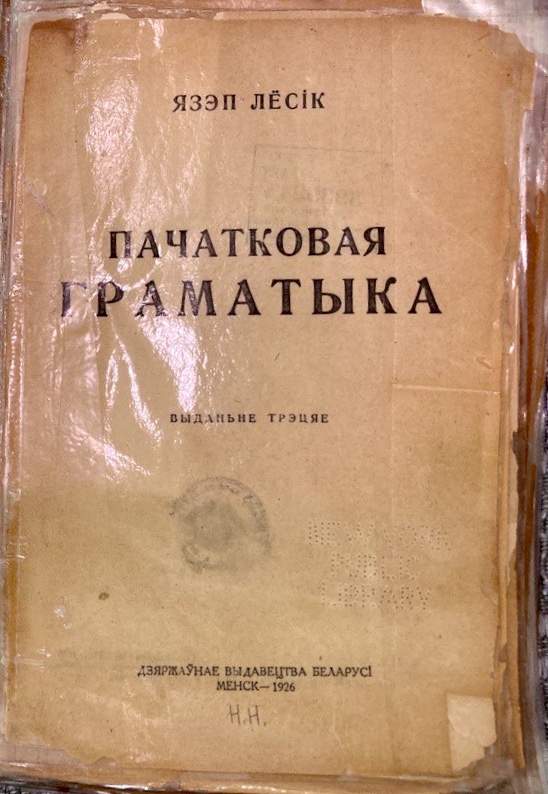Працягваем аповед пра айцоў-заснавальнікаў беларускае дзяржаўнасьці, навукоўцаў і літаратараў, рэпрэсаваных у часы сталінскага тэрору, чые кнігі ўвайшлі ў выставу “Няскораныя”. Тут мы згадаем другога старшыню БНР – беларускага пісьменьніка, мовазнаўцу і акадэміка Беларускай акадэміі навук Язэпа Лёсіка (1883 – 1940).
Яшчэ маладым настаўнікам у царскай Расеі Лёсік зазнаў арышты, уцёкі з турмы і высылку ў Сібір за палітычную агітацыю сярод сялянаў. Пасьля лютаўскай рэвалюцыі 1917 г. ён вяртаецца ў Беларусь і далучаецца да нацыянальнага руху як адзін зь лідэраў Беларускае Сацыялістычнае Грамады. А ўжо праз год становіцца адным зь ініцыятараў абвяшчэньня незалежнасьці Беларускае Народнае Рэспублікі і абіраецца на пасаду старшыні Рады БНР. Застаючыся на гэтай пасадзе да 1919 г., Лёсік актыўна змагаецца за міжнароднае прызнаньне рэспублікі і захаваньне беларускіх тэрыторыяў у ейных межах.
У 1920 г. Я. Лёсік адыходзіць ад палітычнай дзейнасьці і займаецца навуковай, культурніцкай і літаратурнай працай. Ён выкладае ў Беларускім дзяржаўным унівэрсытэце, абіраецца чальцом Інбелкульту, кіруе Інстытутам беларускае мовы, а ў 1928 г. становіцца акадэмікам Беларускае акадэміі навук.
Як навуковец, Лёсік зрабіў велізарны ўнёсак у разьвіцьцё беларускае мовы: выклаў канцэпцыю фармаваньня літаратурнае мовы, займаўся ўнармаваньнем граматыкі і артаграфіі, браў удзел у навуковай палеміцы. Вядомы выпадак зь ягонай выкладчыцкай біяграфіі, калі на закід, што ён недастаткова паказвае падабенства беларускай і расейскай моваў, Лёсік адказаў, што мову творыць розьніца, а не падабенства, і таму выкладаць ён будзе беларускую мову зь ейнымі асаблівасьцямі. Пэўны час разыходзіўся ў поглядах зь іншымі вядучымі мовазнаўцамі на чале з Б. Тарашкевічам і С. Некрашэвічам адносна ўжываньня асыміляцыйнага мяккага знаку – прапаноўваў скасаваць яго дзеля эканоміі месца.
Ён быў аўтарам некалькіх падручнікаў, актыўна публікаваўся ў пэрыядычным друку. У 1922 г. выходзіць ягоная “Практычная граматыка беларускае мовы», якую абвяшчаюць “контррэвалюцыйнай”. У канцы таго ж году яго арыштоўваюць і вызваляюць толькі дзякуючы ўмяшаньню наркама асьветы Ў. Ігнатоўскага. Але ўжо ў 1930 г. Лёсіка адным зь першых арыштоўваюць па сфабрыкаванай справе “Саюзу вызваленьня Беларусі” і пазьней высылаюць у Саратаўскую вобласьць на 5 гадоў, дзе ён час ад часу працуе выкладчыкам. У Беларусь ён больш не вярнуўся – у 1935 г. быў амніставаны бяз права вяртаньня, а ў 1938 г. ізноў арыштаваны па справе “Контррэвалюцыйнай арганізацыі палітссыльных у Саратаве”. У 1940 г. зноў асуджаны, гэтым разам – да 5 гадоў лягераў. Ён памёр на другі дзень пасьля абвяшчэньня прысуду ў Саратаўскай турме.

Скарынаўская бібліятэка мае ў калекцыі наступныя творы Язэпа Лёсіка:
- Наша крыніца. Чытаньне для беларускіх школ. Выданьне другое выпраўленае. Берлін, 1922.
- Пачатковая граматыка. Выданьне трэцяе. Менск, 1926.
We continue the story about the founding fathers of the Belarusian statehood, academics and writers persecuted during Stalin’s purges and whose books can be seen in The Unbroken exhibition. Here we will remember the second chairman of the Belarusian Democratic Republic – the writer, linguist and academician of the Belarusian Academy of Sciences Jazep Losik (1883 – 1940).
As a young teacher in tsarist Russia, Losik experienced arrests, escape from prison and exile to Siberia for political agitation among peasants. After the February Revolution of 1917, Losik returned to Belarus and joined the Belarusian independence movement as one of the leaders of the Belarusian Socialist Assembly party (Hramada). A year later, he became one of the initiators of the declaration of independence of the Belarusian Democratic Republic and was elected chairman of its Council (Rada). Remaining in that position until 1919, Losik actively sought international recognition of the new republic and the preservation of the ethnic Belarusian territories within its borders.
In 1920, Losik withdrew from political activity and engaged in academic, cultural and literary work. He taught at the newly established Belarusian State University, was elected a member of Inbelkult (the forerunner of the Belarusian Academy of Sciences), managed the Institute of the Belarusian Language, and in 1928 became an academician of the Belarusian Academy of Sciences.
As an academic, Losik made a huge contribution to the development of the Belarusian language: laid out the concept of the formation of a literary language, developed the standardisation of its grammar and orthography, and took part in academic polemics. There is a well-known case from his teaching biography: to the criticism that he did not sufficiently shown the similarities between the Belarusian and Russian languages, Losik responded that language was created by differences, not similarities, and therefore he would teach the Belarusian language with all its particularities. For some time, he disagreed with other leading linguists, led by Taraškievič and Niekraševič, regarding the use of the assimilation soft sign (ь): he proposed to abolish it in order to save space in written texts.
He authored several textbooks and actively contributed to periodicals. In 1922, his Practical Grammar of the Belarusian Language was published, but it was declared ‘counter-revolutionary’. At the end of the same year, he was arrested and released only thanks to the intervention of the then Minister of Education Ihnatoŭski. However, in 1930, Losik was one of the first to be arrested on the trumped-up charges of the Union for the Liberation of Belarus and later exiled to the Saratov Oblast of Russia for 5 years, where he occasionally worked as a teacher. He was never able to return to Belarus: in 1935 he was released without the right to return just to be rearrested in 1938 on charges relating to the case of the ‘Counter-Revolutionary Organisation of Political Exiles’ in Saratov. In 1940, Losik was sentenced to 5 years in the Gulag but died in the Saratov prison the day after the verdict was announced.
The Skaryna Library is proud to have Jazep Losik’s original publications in its collection:
- Our Source. Reading for Belarusian schools. The second corrected edition. Berlin, 1922.
- Elementary Grammar. The third edition. Minsk, 1926.